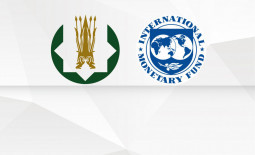Press-release №9. As a result of the Article IV consultations the IMF commended the National Bank's commitment to inflation targeting
On November 4-17, 2021, the International Monetary Fund conducted an Article IV Mission to Kazakhstan led by Nicolas Blancher, Head of IMF Mission to Kazakhstan. On March 21, 2022, IMF finalized a Staff Report outlining the outcomes of the mission, which was published on April 11, 2022.
According to IMF, a strong fiscal stance together with a substantial volume of foreign reserves and timely measures implemented in response to the pandemic assisted Kazakhstan in absorbing external shocks and aided subsequent recovery of economic activity. These factors resulted in real GDP growth of 4% in 2021 and in the return of pre-pandemic economic growth trajectory.
Amidst geopolitical tensions, the secondary impact of sanctions against Russia will affect Kazakhstan’s economic growth and increase inflationary pressure in 2022. Main uncertainty about Kazakhstan’s economic development is attributed to this predicament, along with continuing pandemic and persisting social unrest. IMF forecasts GDP growth rate to fall to 2.3% in 2022. IMF analysts highlighted that in the long term, sustained economic growth will necessitate more economic diversification and resolute measures, including ones concerning climate change.
In IMF’s view the National Bank increased the base rate in line with external instability and inflationary pressure, signaling a potential further tightening of monetary policy, if needed. Given the gravity of inflation and fiscal stimulus, IMF analytics evaluate the current monetary policy as being reasonably tight and justified. Inflation reached 8.7 % in February this year which is above the inflation target of 4-6% set by the National Bank, largely due to increased food prices. At the same time, IMF estimates heightened inflation in 2022, but forecasts its decrease to 4% in the medium- term.
IMF commends the National Bank’s commitment to inflation targeting and positively assesses the transition to a full-fledged inflation targeting regime, increased transparency and monetary policy independence, effective communication, as well as developing the central bank’s analytical capacity. In particular, IMF highlighted the Monetary Policy Strategy 2030 aimed at lowering inflation to 3-4% by 2025. IMF also stressed that creating a Monetary Policy Committee, briefings and clarifications on base rate decisions, publishing data on FX operations, as well as a continuous bilateral dialogue with the IMF in the framework of consultations and technical assistance are the key drivers of aforementioned positive developments.
Further efficiency of monetary policy is subject to continuous progress in analytical capacities and communications, development of domestic capital market, decrease of dollarization, and increase of independence and credibility in National Bank’s policy, as well as withdrawal from economic support programs. IMF experts are unanimous in that improved monetary and fiscal policy coordination will aid curbing inflation. IMF supports authorities’ plans to make fiscal policy more counter-cyclical and implement new budget rules in order to ensure fiscal sustainability and equitable distribution of wealth between generations.
IMF staff emphasized the significance of further strengthening the supervision and regulation of the financial market to ensure financial stability, specifically in conditions of rapid growth of consumer lending.
The next Staff Report on the results of IMF Mission’s visit to Kazakhstan in the framework of Article IV consultations is expected to be published in 2023.
More detailed information for mass media is available upon request:
+7 (7172) 77–52–10
e-mail: press@nationalbank.kz
www.nationalbank.kz




